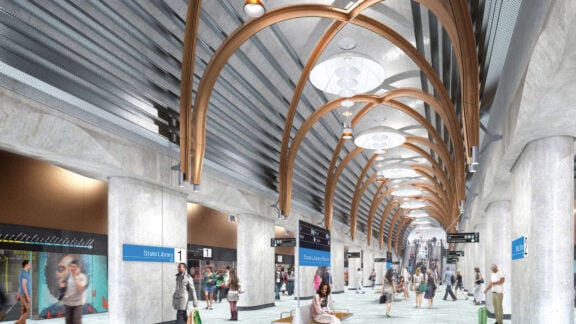Reactions are pouring in from Australian industry representatives and individual manufacturers on the impact of sweeping US tariffs announced on Thursday.
Markets were rocked when US President Donald Trump’s ‘liberation day’ tariffs exceeded traders’ fears, just two days after the Reserve Bank of Australia held the cash rate steady.
As the escalating global trade war spurs the biggest losses since the COVID pandemic, cheap goods diverted to Australia are also likely to put downward pressure on imported inflation.
Australian steel businesses are among the first ones to feel the effect of falling prices after tariffs on steel confirmed in early March were followed by Trump’s blanket 10 per cent tariff on all imports including from Australia.
Paul Gianniotis is the managing director of ProWay, a company with its head office in Wagga Wagga, NSW.
They build livestock management equipment for domestic and international clients using steel from Australia and overseas.
According to Gianniotis, even before the US tariffs were announced, Australian steel producers were already facing competitive prices of imported steel, at a rate of around 10 per cent cheaper than domestic suppliers.
Following the tariffs, the price difference now stands at 20 per cent, Gianniotis told the ABC, with importing steel becoming more attractive as an option.
“A lot of the steel going into the USA [will be] out of the market, and that’s going to have to find a home.
“So, if you just look at the tariffs alone and what will likely happen, [there is] going to be a glut of steel on the planet and, you know, there should be deals to be had.”
Speaking to the ABC, Mark Cain, chief executive of the Australian Steel Institute, the peak representative body for steelmakers, echoed the gloomy prediction for local businesses.
“My primary concern is the disruption to global trade of steel products.
“We are an open economy. We export a lot of product, and so we could become a dumping ground for steel products,” Cain said.
Despite the tariffs being announced this week, recently signed export deals to the US are also seemingly at stake.
Speaking to The Age, Michael Paidoussis, co-founder of Melbourne-based Crusader Caravans, stated he was worried about the unexpected tariff cost he is left to digest, following a recent deal with a dealership network in Florida.
The agreement for an export of 50 caravans is worth about $3.5 million.
“We are hoping to have the caravans leaving our shores in the next two weeks, and we’ve got another three US caravan dealers we’re talking to because we’re about to get that US accreditation,” Paidoussis told The Age.
“Unfortunately, the timing has been a little bit off this time. The devil will be in the detail … but from what I understand, this deal will not escape Trump’s tariffs.”
The Australian caravan maker has had initial conversations with their trade partners on how the cost can be absorbed, but Paidoussis said the margin pressure on the business is high.
“The tariff is difficult to digest, and we’re trying to decide on the impact on demand on sales volumes if we pass it on. If the tariff is 10 per cent, we’ve got to account for that immediate 10 per cent tariff cost on these products which directly increases our landing costs.”
In its twice-yearly Financial Stability Review on Thursday, the Reserve Bank of Australia. noted uncertainty posed by the tariffs could have a “chilling effect” on household and business spending decisions, impacting economic activity.
HSBC chief economist Paul Bloxham said he expects the RBA to cut rates to 3.1 per cent by early 2026 – 50 basis points lower than before – because of the negative impact the tariffs will have on global growth.
HSBC, ANZ and Barrenjoey all pulled forward their rate cut predictions to the RBA’s next meeting in May.
Meanwhile, traders are waiting to hear the RBA governor’s fresh reactions to the tariffs.
Michele Bullock is set to deliver a speech at the Chief Executive Women annual dinner in Melbourne on Thursday.
“We’d expect a significant shift in rhetoric and for Bullock to make clear that the board stands ready to ease if the outlook softens,” ANZ economists said in a research note.








